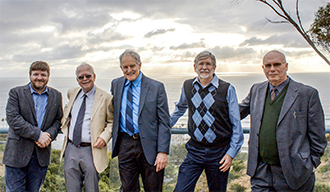National University hosted a special event this spring for five of its College of Letters and Sciences (COLS) faculty who have recently published books on topics ranging from the origins of the warfare state to theories of learning.

COLS professors honored from L-R: Colin Dickey, Ph.D.; Leslie “Tom” Pollard, Ph.D.; Carl Boggs, Ph.D.; B. Charles Tatum, Ph.D.; Igor Ya Subbotin, Ph.D.
“We are proud of these professors and the books they have written,” said Dr. Carol Richardson, dean of the College of Letters and Sciences. “The success they experience in publishing enhances their reputation and helps to promote the academic quality of National University and its outstanding faculty.”
Dr. Richardson hosted the event, which included a special dinner, to honor the authors at the Birch Aquarium in La Jolla on Tuesday, May 9. The dinner was attended by Dean Richardson and her department chairs, as well as National University Provost, Dr. Gangaram Singh.
The faculty honored are:
Colin Dickey, Ph.D., professor in the COLS department of arts and humanities and author of “Ghostland: An American History in Haunted Places.”
Carl Boggs, Ph.D., professor in the COLS department of social sciences and author of “Origins of the Warfare State: World War II and the Transformation of American Politics.”
Leslie “Tom” Tom Pollard, Ph.D., professor in the COLS department of social sciences and author of “Loving Vampires: Our Undead Obsession.”
B. Charles Tatum, Ph.D., professor in the COLS department of psychology and author of “Learning Learning: Facts, Theories, and Principles (2nd Edition).”
Igor Ya Subbotin, Ph.D., professor in the COLS department of mathematics and natural sciences and co-author of “The Survey on Infinite Groups: a Guide to Some Classical Areas.”